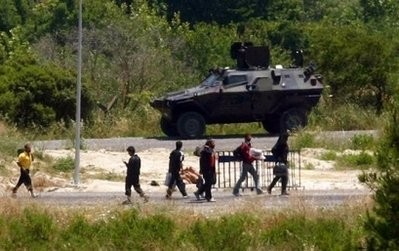Syrian troops backed by tanks entered a border zone on Thursday, sending hundreds of people fleeing into Turkey as protests against President Bashar al-Assad's rule hit the 100-day mark.
The Local Coordinating Committees organising the protests vowed in a statement to keep the heat on the Damascus regime and pursue the "peaceful revolution until we have a free and democratic Syria."

The European Union also increased the pressure, adopting new sanctions that added 11 more individuals and businesses to a list of Syrians already targeted, diplomats said.
Some 600 people broke through barbed wire marking the frontier to seek haven in Turkey from a deadly crackdown on dissent back home, advancing on a road a few kilometres (miles) from the village of Guvecci.
Several hundred more people were seen down the road and the authorities brought in minibuses to ferry the refugees to tent cities set up by the Turkish Red Crescent in Hatay border province.
Syrian troops backed by tanks stormed the border village of Khirbet al-Joz, where many of the displaced had massed, an activist at the scene told AFP.
A Guvecci resident said he saw soldiers crossing a hill on the Syrian side less than a kilometre from the border after dawn.
A Turkish flag raised a few days earlier by Syrian refugees in gratitude at Ankara's hospitality was replaced by a Syrian one, an AFP journalist witnessed.
A Turkish smuggler with relatives on the Syrian side told AFP tanks were on stand-by at Khirbet al-Joz, but plainclothes police were descending on farms outside the village, some 500 metres (yards) from the frontier.
And a Syrian imam who arrived in Guvecci on Thursday told AFP that Syrian soldiers were blocking access to the border.
"The army took control of villages and are blocking roads," the cleric who identified himself as Rami said, adding that he fled with the help of a people smuggler after hearing gunfire.
The head of Turkish Red Crescent Tekin Kucukali spoke of a "surge of activity at the border."
"There were over 600 entries today," he said, adding that more than 11,000 Syrians had taken refuge in Turkey.
Turkish Foreign Minister Ahmet Davutoglu discussed the border situation separately over the phone with his Syrian counterpart Walid Muallem and EU foreign policy chief Catherine Ashton, Anatolia news agency reported.
The Turkish foreign ministry also summoned Syria's ambassador, Abdullah Derdairy, for talks on the situation, it said.
Thousands of Syrians have flocked to the border but many have hesitated to enter Turkey, wary of leaving their property behind, and live in the open air or in makeshift shelters, surviving on scarce food and water.
Syria's official SANA news agency reported on Thursday that more than 700 refugees had returned home to the restive northern border town of Jisr al-Shughur.
Meanwhile the London-based Syrian Observatory for Human Rights said security forces arrested more than 120 people late on Wednesday and early on Thursday in and around Tall Rifaat village near the border.
More than 1,300 civilians have been killed and some 10,000 people arrested since pro-democracy protests erupted on March 15, Syrian human rights groups say.
The Local Coordinating Committees marked 100 days since the start of the protests by saying the uprising will go on.
"We emphasize that our peaceful revolution will continue until the fall of the regime and until we build a new, free and democratic Syria," a statement said. "One hundred days, and our revolution is ongoing."
Activists said a call by the Facebook group Syrian Revolution 2011 for a general strike to mourn those killed in the crackdown was partly observed.
They said shops and businesses closed in parts of the flashpoint central cities of Homs and Hama, in the Damascus suburbs of Douma and Muadamiyeh, the western town of Banias and the northwestern city of Qamishli.
Villages in the southern province of Daraa, epicentre of the protests, also observed it.
The group also called on Syrians to stage rallies on Friday, the weekly Muslim day of rest and prayer that has become a springboard for demonstrations, to signify the regime has lost its legitimacy.
"Bashar is no longer my president and his government no longer represents me," is the theme for Friday's rallies.
In Brussels a statement from Ashton's office said new sanctions were slapped on seven Syrians and four companies linked to the regime "in view of the gravity of the situation."
After already targeting 23 Syrians, including Assad and members of his inner circle, the new list includes three Iranians who will also be hit by an asset freeze and travel ban, and come into force Friday, diplomats said.
The three Iranians are accused of militarily aiding Syria's crackdown.







)
















